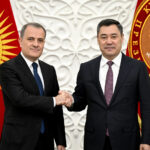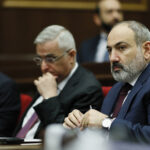Summer 1982. Crimea. Yalta. Artek, the most famous Young Pioneer camp in the USSR. Yet another group, international relay races, guests and children from the countries of the Council for Mutual Economic Assistance and the Warsaw Pact bloc, a few “lucky ones” from the capitalist bloc, as well as developing countries that have chosen the “progressive” socialist path. The 15-year-old French teenage girl quoting from Boris Pasternak’s Doctor Zhivago, a book banned in the Soviet land at the time, stood out among thousands of children. She caught the eye of Young Pioneer leaders, one of whom was an employee of the First Chief Directorate (PGU) of the KGB of the USSR (foreign intelligence). He requested the girl’s file, which said that she was the daughter of the famous French economist and millionaire Dominique Roux, an admirer of Dostoevsky and Tolstoy. The KGB officer quickly realized that this was a great chance that would lay groundwork for an even greater future. After receiving Kryuchkov’s personal permission (permission to recruit a foreign citizen, much less a minor, could be given only by the head of the PGU KGB), they began to “work” the girl… The incentive was not money, since her family had plenty of it. The recruitment was based on ideological reasons, and true believers are always the most reliable.
Some of you may have guessed that the 15-year-old girl vacationing at Artek at the height of the Cold War was none other than Valerie Roux, married name Pécresse. The Madame Pécresse who recently challenged Macron and cannot wait to move into the Elysee Palace in 2022.
Roux-Pécresse’s career in politics has been dizzying to say the least—any French woman could envy her. Member of the National Assembly, Minister of Higher Education and Research, Minister of the Budget (in this capacity she was involved in the scandal around the sale of the Alstom conglomerate, adding 2 million euros to her family budget), Government Spokeswoman, President of the Regional Council of Île-de-France. Presidential candidate.
The connection with the Soviet/Russian secret services, who, to put it mildly, helped her advancement, bleeds through the entire career of the “lady in red”. She was 16 when she passed her baccalaureate to be accepted to France’s most prestigious business school. Later she was top of her class at the École Nationale d’Administration. In 1990-1991, she did an internship at the French embassy in the USSR (USSR, again?) and met journalist Sergei Jirnov. Jirnov’s press credentials, however, were no more than a standard cover used by illegal agents (Directorate S of the PGU KGB) at the time. It was with Pécresse’s glowing recommendation that Jirnov was accepted to the ENA, the traditional school for the French civil servants. This is how a KGB/SVR agent infiltrated the alma mater of 7 French Prime Ministers and 4 French Presidents, including the incumbent Emmanuel Macron. Jirnov’s path would cross Pécresse’s more than once in the future. When the latter was elected member of the National Assembly in 2002, Jirnov was granted asylum in France. They emailed one another, but in 2007, Pécresse cut off all contact with the defector (at the behest of her handlers in Yasenevo, it should seem). Jirnov kept the correspondence. He said jokingly in an interview once that “should Pécresse become President one day, this correspondence will be worth a lot of gold.” Apparently, that day is just around the corner…
But before we go on, let’s go back to the summer of 1982. Yuri Andropov, the chairman of the Soviet KGB of many years, already sat in Suslov’s chair at the time and was, for all intents and purposes, number two in the country and number one candidate to replace now decrepit Brezhnev. Andropov knew the real situation in the country and the real state of it better than anyone in the USSR. According to former senior KGB officials and Russian historians with access to the KGB archives, Andropov was in possession of analytical reports predicting the future of the USSR and, therefore, knew what awaited the Soviet Union. Admittedly, he could hardly imagine that it would happen mere 6 years after his death and that the grave for the USSR would be dug by his appointee Gorbachev. But even then, the cogs were turning in the bowels of the KGB machine, drafting plans to create conflict areas within the country so that Moscow could keep levers of pressure on the Union republics. The KGB also paid great attention to the recruitment and advancement abroad of those who showed political promise—in order to have pro-Moscow people at the helm of foreign states in the future. One has to applaud the foresight of those at the Soviet PGU KGB who saw great potential in the 15-year-old French teenager and insisted on “working” her…
However, both sides have made an unfortunate blunder in this decades-long game. As we know, the Foreign Ministry of Azerbaijan responded sternly to Pécresse’s illegal visit to Karabakh region. The question here is how the candidate for France’s presidency got into Karabakh through the Lachin corridor controlled by the Russian peacekeepers in the first place. Neither the peacekeepers’ command nor the Russian Ministry of Defense informed Baku of Pécresse’s arrival in Karabakh, although they were supposed to, as this is Azerbaijan’s sovereign territory where the Russian troops are temporary guests. And yet, Pécresse passed through the Russian checkpoint in Lachin without delay. Why? Given all of the above, namely the details of Pécresse’s biography, the obvious answer is that the passage was secured by the SVR (or the secret service handlers in the Kremlin) for their inside woman, their veteran agent. Only great services rendered to Russia could guarantee a French presidential candidate, a far-right politician to boot, an unimpeded passage to Karabakh. It would be laugh-out-loud funny, if it wasn’t so obvious.
For the French, on the other hand, there is nothing to laugh about. Sure, Pécresse has won the sympathies of the “white” France with her unbending stance on uncontrolled migration and raging Islamophobia. But would that outweigh the fact that Pécresse is essentially Moscow’s minion and, should she win the election, will pursue a policy not in the interests of her country but in those of her Kremlin handlers? Her stance should have long given pause to the French Atlanticists, who are in the majority in the Fifth Republic. As you recall, she said that France must stop being a US vassal and China’s backyard. Madame Pécresse has so far been choosing her words carefully when speaking about Russia—logically enough. No need add before time to the rumors already suggesting that she is a puppet of the Kremlin…
Translated from Caliber.Az
Aze.Media












